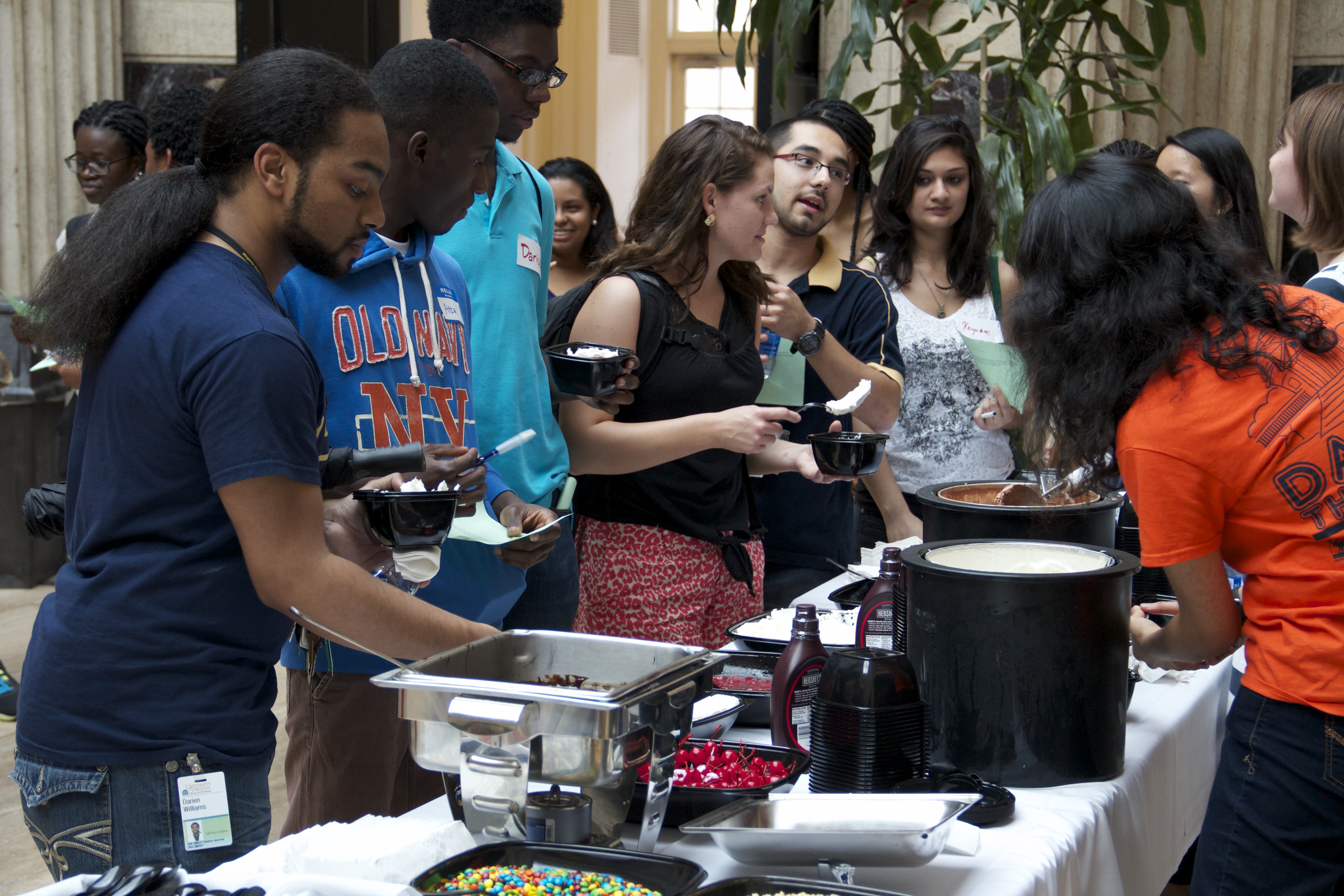Ice cream toppings and research topics were liberally shared by University of Virginia undergraduate researchers in the Clark Hall mural room on June 8, in a summer research kick-off event sponsored the Center for Undergraduate Excellence in collaboration with the Graduate Student Diversity Program and the Curry School Summer Undergraduate Research Program. Students chatted about their work – the brain science behind eating, drug testing for breast cancer and the development of foot muscles, to name a few – while enjoying hard-packed ice cream complete with sprinkles, M&Ms, chopped strawberries or fudge sauce.
The event was a social occasion for the student researchers – future teachers, nurses, engineers, astronomers, doctors and many disciplines in between – who are among the hundreds staying on Grounds to take advantage of summer research opportunities the University of Virginia has to offer.
“I’m studying the scaling relationships in intrinsic foot muscles as part of a lab,” said Alexis Xu, a third-year biomedical engineering major in the School of Engineering and Applied Sciences. “I was really excited about receiving the grant this year, and I’m hoping to turn this into my capstone project fourth-year, which would examine how flat-footedness develops in the foot over time.”
Many undergraduate researchers are participating in summer programs such as the College Science Scholars, the Virginia-North Carolina Alliance Summer Research Program or a National Science Foundation Research Experience for Undergraduates placement at the University. These U.Va.-sponsored programs typically offer a stipend to all participants and provide on-Grounds housing that helps foster U.Va.’s distinct residential culture, even when school is in summer session.
In other cases, professors or U.Va. laboratories ask students to assist in ongoing research projects, which allow students to contribute to graduate and professional-level work. Erin Rodenberger, a rising fourth-year mechanical engineering major is a research intern in the Center for Applied Biomechanics, where she is studying how details sent by automatic crash response systems can be used to predict injury and ensure that the victim is sent to the correct hospital.
“I’ve always been very academically oriented,” she said. “In engineering classes there’s always a right answer, but here in the lab there’s not!”
Many undergraduates pursue grant-funded independent research projects with the help of a faculty mentor. The Harrison Undergraduate Research Awards and the Double Hoo Awards both finance student research.
Their research topics are diverse. Nicole Penn, a third-year history and foreign affairs double major and Harrison recipient, is spending her summer in Charlottesville to research the experience of American Catholics in the Civil War.
Catherine Zucker, a third-year double major in history and astrophysics, and Sandra Liss, a second-year graduate student majoring in astronomy, are collaborating through their Double Hoo grant to research star formation and galaxy evolution through dwarf-dwarf galaxy interactions, the first systematic, high-resolution and high-sensitivity study of its kind.
“Undergraduate research has been identified as a high-impact educational practice and a number of studies have cited its role in cognitive development, building skills and knowledge, and leading to a sense of accomplishment,” said Brian Cullaty, the director of undergraduate research opportunities at the Center for Undergraduate Excellence. Cullaty helped organize the Sunday social event, which served to help students from across research fields meet and engage in cross-disciplinary dialogue.
“Events in which students can share their research experiences, from here at U.Va. or other universities, allow students to engage with new ideas directly from their peers,” Cullaty said. “It also allows them to learn about different fields and different approaches to particular topics of inquiry..”
Cheese and pepperoni will likely bring them together next, when the center hosts research poster presentations and pizza on July 22. But which will bring out more students – pizza or ice cream? The results are yet to be determined.
Media Contact
Article Information
June 17, 2014
/content/undergrads-get-scoop-each-other-s-research-kick-event

